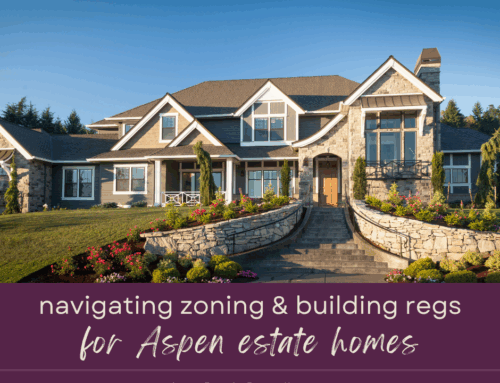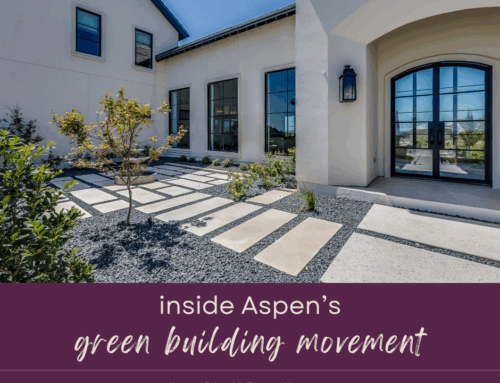Aspen is known for its stunning views, world-class recreation, and luxury homes—but some buyers want to take it a step further and build something truly custom. If that’s your plan, buying land might be the first step. However, buying land in Aspen’s high-end market is very different from buying a finished home. There are legal, environmental, and logistical factors that need to be considered before you commit. Whether you want a secluded mountain retreat or a statement home near downtown, it pays to understand what you’re getting into.
What to Know Before Buying Land in Aspen’s High-End Market
Aspen’s land market offers potential, but it also includes challenges such as strict regulations and limited availability. This guide explains the following:
-
Zoning and land use regulations
-
Access to utilities and infrastructure
-
Lot location and building potential
-
Environmental and site-specific concerns
-
Long-term investment and resale value
Here’s a closer look at each.
Zoning and Land Use Regulations
Zoning is one of the most important issues to understand when buying land in Aspen. The city and Pitkin County have strict land use codes that control what you can build, how large your home can be, and how the land is used. Depending on the zone district, your building envelope may be limited in height, square footage, or style.
Some areas also require site plan reviews, special use permits, or historical preservation considerations. If you’re planning a guest house, barn, or detached garage, you’ll want to confirm that it’s allowed under current zoning rules.
Working with a REALTOR® who understands Aspen’s zoning laws can help you avoid buying a lot with unexpected limitations.
Access to Utilities and Infrastructure
Not all land in Aspen is immediately ready for building. Some parcels—especially those in more rural parts of McLain Flats, Owl Creek, or Woody Creek—may not have access to public water, sewer, or electricity. In these cases, you may need to budget for a well, septic system, or utility extension, which can add significant cost and time.
Also, make sure the property has year-round access. Some lots may require snow plowing or may be reached only by private or seasonal roads. If the road is not maintained by the county, you’ll be responsible for access during the winter months.
Understanding these issues up front is essential, particularly if you plan to live in the home full-time or use it as a year-round rental.
Lot Location and Building Potential
The location of the lot affects not only your lifestyle but also your construction costs. Steep lots or rocky terrain can require specialized foundations or excavation, which may raise the price of your build. South-facing lots typically get more sun and are more desirable for natural lighting and energy efficiency.
Views also matter. In Aspen, lots with unobstructed views of the Elk Mountains or ski slopes carry a premium—and often hold long-term value. However, view protection ordinances may affect what and where you can build, especially if neighboring homes or protected land are nearby.
You can explore Aspen real estate listings that include buildable lots and see how land is marketed in different parts of town.
Environmental and Site-Specific Concerns
Because Aspen is surrounded by protected land, wildlife habitats, and natural water sources, environmental regulations are often a factor when buying land. Wetlands, floodplains, and wildlife corridors can limit where or how you build.
You may need environmental impact assessments or additional approvals for grading, tree removal, or land modification. Some parcels may also be subject to conservation easements or open space agreements that restrict development.
You can consult EPA.gov to learn more about environmental assessments for land development and how to approach projects in sensitive ecosystems.
Long-Term Investment and Resale Value
Land in Aspen can be a smart investment, especially since developable parcels are becoming harder to find. However, it’s not a guaranteed short-term return. Construction costs, permit timelines, and architectural reviews can add months—or even years—to your project.
That said, well-located land with clear building potential tends to appreciate over time, particularly in areas close to ski resorts, downtown, or trail systems. Parcels with existing infrastructure, road access, and completed surveys often move faster and hold value better than raw, undeveloped lots.
Buyers who work with architects, builders, and REALTORS® early in the process tend to avoid costly surprises and delays.
FAQ About Buying Land in Aspen
Check out these commonly asked questions about buying land in Aspen. If you don’t see your question here, please call our office and we’ll find you the answers you need.
Can I Build Any Size Home on My Land?
No. Aspen and Pitkin County have strict zoning laws that limit home size based on lot size, location, and environmental impact. Always check the specific zoning designation.
How Do I Know if a Lot Is Buildable?
A site analysis by a builder, engineer, or land planner can confirm whether the property meets legal, environmental, and structural requirements for building.
Will I Need a Permit for Utilities?
Yes. If the lot doesn’t have existing utility access, you’ll need permits to install a well, septic system, or connect to the grid. These steps can add time and cost.
Are There Extra Costs After I Buy the Land?
Yes. You should budget for soil testing, architectural design, permits, environmental studies, and utility hookups. A REALTOR® can help you estimate these costs.
Is Land in Aspen a Good Investment?
It can be. Aspen’s limited land supply and strong buyer demand make high-quality parcels valuable, but it’s important to evaluate buildability and long-term plans first.
Buying land in Aspen is a big opportunity—but it’s also a complex process. From zoning to environmental factors to infrastructure, there’s a lot to consider. With the right guidance and a REALTOR® who understands the local market, you can find a lot that fits your vision and build a home that reflects everything you love about living in Aspen.
Get a FREE CMA on your home in 24hrs or less!
It's a SELLERS Market! Even if you are even just THINKING about selling, knowing what your home's TRUE market value is valuable information. Fill in your info below and we will send you a complete Market Value Report that shows you what it is REALLY worth in today's market.
Are You Selling or Buying a Home in Aspen?
If you’re ready to sell your home in Aspen, Woody Creek, Basalt, Carbondale or Snowmass, we may be able to help you.
Get in touch with us right now to find out how much your home is worth – and discover how we’ll be able to help you sell it quickly and for top dollar.
If you’re also looking for a home for sale in Aspen or a nearby community, check out our listings by price in the table below.
Aspen Homes for Sale by Price
| $200k to $300k | $300k to $400k | $400k to $500k |
| $500k to $600k | $600k to $700k | $700k to $800k |
| $800k to $900k | $900k to $1 million | Over $1 million |

























